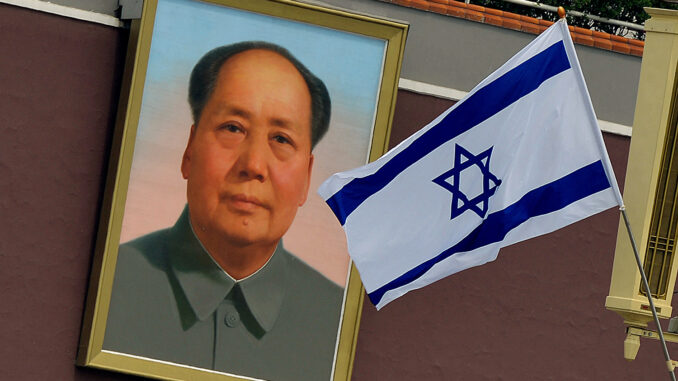Much has been made about the Jewish state’s growing ties with China. But those ties are loosening, and if a new cold war is in the offing, Jerusalem won’t be on Beijing’s side.
By ASSAF ORION, MOSAIC SEPT. 6 2022

The Israeli flag flies beside a portrait of Mao Zedong at Tiananmen Gate in Beijing on May 8, 2013. MARK RALSTON/AFP via Getty Images.
The headlines speak for themselves. Two years ago, a writer in Foreign Policy lamented that the U.S. has tried and failed to “get Israel to break up with China.” A year later, it was the editor of the Jerusalem Post who argued that Israel “has to choose” between Washington and Beijing, while the Washington Post noted that Israel’s failure to do so was “testing its relationship with the U.S.”
Before digging into the current details, some background is in order. The natural place to begin is in 2012, when Xi Jinping became the general secretary of the Chinese Communist Party (CCP) and president of China. The following year, China announced what came to be known as the Belt and Road Initiative—a vision of a global network of transportation, industry, and telecommunication infrastructure that would advance Beijing’s economic and strategic agendas. In concrete terms this meant investing in the building of ports, railways, power plants, cellular networks, and so forth across Asia and into not only Europe and Africa, but also Latin America and the Arctic, with the goal of creating an integrated “new silk road.” In the past year, Beijing also announced the Global Development Initiative and the Global Security Initiative—as yet vaguely defined, mutually reinforcing efforts to promote sustainable development and security based on “respect for sovereignty and territorial integrity” in accordance with China’s worldview and interests.
Against these, Washington has worked with its allies to advance several counter-efforts: the G7’s Partnership for Global Infrastructure and Investment to provide an alternative to the Belt and Road that helps low- and middle-income countries develop their infrastructure in environmentally sound ways; the Quad, a security forum for strategic dialogue among the U.S., Australia, India, and Japan, revitalized to manage maritime security, economic, and humanitarian issues; the 2021 pact among the U.S., UK, and Australia to cooperate on security issues in the Indo-Pacific, known as AUKUS; and the Partners in the Blue Pacific, an alliance of the AUKUS countries plus Japan and New Zealand that seeks to offset China’s influence in the Pacific. NATO has also been awakened by Russia’s war in Ukraine, and is starting to see its role expanding beyond Europe towards the Indo-Pacific.
Beyond the questions of infrastructure, trade, military buildups, and diplomatic and economic alliances that are familiar arenas of Great Power competition, emerging technologies—especially semiconductors—have become vital issues. Just last month, President Biden signed the CHIPS and Science act, providing $52.7 billion for American semiconductor research, development, and manufacturing in order to address the growing risks posed by Asian domination of this industry, and America’s increasing dependence on foreign supply chains. The administration also banned the export of top-level artificial intelligence-enabling computer chips to China, seeking to slow the latter’s advances in this field.
One might be tempted to imagine a “Silicon Curtain” descending upon a decoupled globe, where neither side buys chips from the other—except that our world is much more intertwined and interdependent than it was during the 20th century’s cold war, and it will remain so for many years even if a new cold war between the U.S. and China intensifies. This evolving situation, replete with internal tensions, opposing goals, and policy contradictions, demands complexity and nuance, which are abundant in America’s policies, as in those of its allies.
Following several years of rapidly growing relations with China since early last decade, this past year continued to provide much evidence of strengthening ties. But that isn’t the whole story.<
>
Where does this leave Israel? Following several years of rapidly growing relations with China since early last decade, championed by then-Prime Minister Netanyahu, this past year continued to provide much evidence of strengthening ties. In September 2021, the Shanghai International Port Group began operating the Haifa Bayport, while the University of International Business and Economics (UIBE) in Beijing opened a campus in Petach Tikvah, near Tel Aviv. On November 17, 2021, Presidents Xi Jinping and Isaac Herzog spoke by phone about the upcoming 30th anniversary of the establishment of diplomatic relations between their two countries and about how to develop those relations further. Vice-President Wang Qishan and Foreign Minister and then-Alternate Prime Minister Yair Lapid headed the fifth meeting of the Sino-Israeli Joint Innovation Committee, which was held virtually on January 24, the day of the anniversary itself. Currently, the two governments are negotiating a free-trade agreement, while the overall volume of trade between them continues to grow. But this isn’t the whole story.
Assaf Orion is a retired Israeli brigadier general and the head of the Diane and Guilford Glazer Foundation’s Israel-China Policy Center at Israel’s Institute for National Security Studies. He writes on Israel’s relations with China, its regional strategy, and more.



Leave a Reply
You must be logged in to post a comment.